-
Tips for becoming a good boxer - November 6, 2020
-
7 expert tips for making your hens night a memorable one - November 6, 2020
-
5 reasons to host your Christmas party on a cruise boat - November 6, 2020
-
What to do when you’re charged with a crime - November 6, 2020
-
Should you get one or multiple dogs? Here’s all you need to know - November 3, 2020
-
A Guide: How to Build Your Very Own Magic Mirror - February 14, 2019
-
Our Top Inspirational Baseball Stars - November 24, 2018
-
Five Tech Tools That Will Help You Turn Your Blog into a Business - November 24, 2018
-
How to Indulge on Vacation without Expanding Your Waist - November 9, 2018
-
5 Strategies for Businesses to Appeal to Today’s Increasingly Mobile-Crazed Customers - November 9, 2018
A First: Womb Transplants in United Kingdom in first half of 2016
Doctors have been granted approval to carry out the UK’s first 10 womb transplants, following the success of the procedure in Sweden.
Advertisement
Timeslive reports that British surgeons will attempt to follow what happened in Sweden after a 36-year-old woman, born without a womb, successfully gave birth following a womb transplant. But choosing candidates has not been easy; out of the many women who stepped forward, 100 qualified and only 10 were chosen. If successful, the women will be impregnated via in vitro fertilization since their Fallopian tubes will not be connected to the “foreign” wombs. However, studies done on women who have undergone kidney transplants and later become pregnant have found that immunosuppressant drugs are relatively safe in pregnancy, Campo-Engelstein said.
The head of the transplant team, Dr. Richard Smith of Queen Charlotte’s and Chelsea Hospital in London expressed enthusiasm over the project, saying that over the years he has been struggling to get the project off the ground. “There is no doubting that, for many couples, childlessness is a disaster”, Smith told The Independent.
“Infertility is a hard thing to treat for these women”, says Dr. Smith.
Research regarding pregnancy is being carried out somewhere in the world on a virtually consistent basis, but pending womb transplant research in the United Kingdom has brewed up a significant measure of controversy.
In order to be eligible for the trial procedure, women must have functioning ovaries, their own eggs, a long term partner, be of a healthy weight and be aged between 25-38.
He said: “In many women, there is a deep yearning to carry children and this is not fulfilled by surrogacy”. Prior to that, each of the women will have embryos created using her own eggs and the sperm of her long-term partner. The baby developed from an IVF embryo will have to be delivered through C-section at eight months gestation.
Dr Smith said the trial would use deceased donors rather than living ones owing to the complexities of the operation. “We don’t want to subject a live donor to that operation”.
This is to minimise the risk of keeping women on immunosuppressant drugs for the rest of their lives, which have side-effects, including an increased risk of cancer.
Around one in 5,000 women is born without a womb.
The trial needs to raise £50,000 before it can take place, with each operation estimated to cost around £40,000, according to BBC News.
Advertisement
Organ donor co-ordinators have suggested that around five wombs per year could be made available to the surgical team. The new mother said: “As soon as I felt this flawless baby boy on my chest, I had tears of happiness and enormous relief”. “Somehow or other, somebody has always turned up and given us enough money to keep it going”.





























